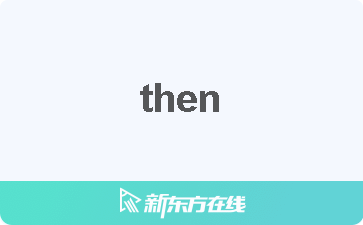- 雅思资讯
- 雅思备考
- 雅思试题
- 互动辅导
新东方-柯林斯雅思备考词典
then
[ADJ, ADV]

1. 当时的
Then is used when you refer to something which was true at a particular time in the past but is not true now.
双语例句
例:a tour of the then new airport.
在当时新机场的一次参观。
ADJ. 形容词
1. 那时
Then means at a particular time in the past or in the future.
双语例句
例:He wanted to have a source of income after his retirement; until then, he wouldn't require additional money.
他想在退休后有个收入来源,而这之前则不需要额外的钱。
例:Executives pledged to get the company back on track. Since then, though, shares have fallen 30 per cent.
主管们发誓要让公司走上正轨,不过那之后股票价格还是下降了30%。
2. 当时
Then is used to refer to something that was true at a particular time in the past but is not true now.
双语例句
例:Richard Strauss, then 76 years old, suffered through the war years in silence.
理查德·斯特劳斯当时已76岁,默默地熬过了战争岁月。
3. 然后
You use then to say that one thing happens after another, or is after another on a list.
双语例句
例:Add the oil and then the scallops to the pan, leaving a little space for the garlic.
往锅里倒入油,然后加入扇贝,再放一点大蒜。
4. 那么
You use then in conversation to indicate that what you are about to say follows logically in some way from what has just been said or implied.
双语例句
例:'I wasn't a very good scholar in school.'—'Then why did you become a teacher?'
“我在学校时成绩不是很好。” “那你为什么当老师呢?”
5. (用于表示话题或谈话结束)
You use then to signal the end of a topic or the end of a conversation.
双语例句
例:'I'll talk to you on Friday anyway.'—'Yep. Okay then.'
“我星期五无论如何都要和你谈谈。” “行,就这么定了。”
6. (用于引入新话题或新观点)
You use then with words like 'now', 'well', and 'okay', to introduce a new topic or a new point of view.
双语例句
例:Now then, I'm going to explain everything to you before we do it.
嗯,我要在我们动手之前向你们把一切都解释清楚。
7. (引导以“if”开头的句子,叙述可能的情况)那么
You use then to introduce the second part of a sentence which begins with 'if'. The first part of the sentence describes a possible situation, and then introduces the result of the situation.
双语例句
例:If the answer is 'yes', then we need to leave now.
如果答案为“是”,那么我们现在就该离开了。
8. (用于句首或and、but之后)话说回来
You use then at the beginning of a sentence or after 'and' or 'but' to introduce a comment or an extra piece of information to what you have already said.
双语例句
例:He sounded sincere, but then, he always did.
他听起来很诚恳,不过,话说回来,他一贯如此。